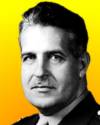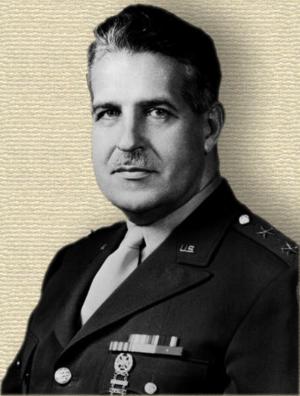 (source)
(source)
|
Leslie Richard Groves
(17 Aug 1896 - 13 Jul 1970)
American army officer and engineer who headed the Manhattan Project (1942-1947) which developed the atomic bomb during World War II.
|
Science Quotes by Leslie Richard Groves (12 quotes)
Each part of the project had a specific task. These tasks were carefully allocated and supervised so that the sum of their parts would result in the accomplishment of our over-all mission.
— Leslie Richard Groves
In And Now It Can Be Told: The Story Of The Manhattan Project (1962), 414.
I first met J. Robert Oppenheimer on October 8, 1942, at Berkeley, Calif. There we discussed the theoretical research studies he was engaged in with respect to the physics of the bomb. Our discussions confirmed my previous belief that we should bring all of the widely scattered theoretical work together. … He expressed complete agreement, and it was then that the idea of the prompt establishment of a Los Alamos was conceived.”
— Leslie Richard Groves
In 'Some Recollections of July 16, 1945', Bulletin of the Atomic Scientists (Jun 1970), 26, No. 6, 21.
In answer to the question, “Was the development of the atomic bomb by the United States necessary?” I reply unequivocally, “Yes.” To the question, “Is atomic energy a force for good or for evil?” I can only say, “As mankind wills it.”
— Leslie Richard Groves
Final statements in And Now It Can Be Told: The Story Of The Manhattan Project (1962), 415.
The key to the utilization of atomic energy for world peace will be found in the will of all people to restrict its use for the betterment of mankind.
— Leslie Richard Groves
Opening address (7 Nov 1945) of Town Hall’s annual lecture series, as quoted in 'Gen. Groves Warns on Atom ‘Suicide’', New York Times (8 Nov 1945), 4. (Just three months before he spoke, two atom bombs dropped on Japan in Aug 1945 effectively ended WW II.)
The maintenance of security … required every member of the project to attend strictly to his own business. The result was an operation whose efficiency was without precedent.
— Leslie Richard Groves
In And Now It Can Be Told: The Story Of The Manhattan Project (1962), 414.
There was positive, clear-cut, unquestioned direction of the project at all levels. Authority was invariably delegated with responsibility, and this delegation was absolute and without reservation. Only in this way could the many apparently autonomous organizations working on the many apparently independent tasks be pulled together to achieve our final objective.
— Leslie Richard Groves
In And Now It Can Be Told: The Story Of The Manhattan Project (1962), 415.
This weapon [the atomic bomb] has added an additional responsibility—or, better, an additional incentive—to find a sound basis for lasting peace. It provides an overwhelming inducement for the avoidance of war. It emphasizes the crisis we face in international matters and strengthens the conviction that adequate safeguards for peace must be found.
— Leslie Richard Groves
Opening address (7 Nov 1945) of Town Hall’s annual lecture series, as quoted in 'Gen. Groves Warns on Atom ‘Suicide’', New York Times (8 Nov 1945), 4. (Just three months before he spoke, two atom bombs dropped on Japan in Aug 1945 effectively ended WW II.)
Those of us who saw the dawn of the Atomic Age that early morning at Alamogordo … know now that when man is willing to make the effort, he is capable of accomplishing virtually anything.
— Leslie Richard Groves
In And Now It Can Be Told: The Story Of The Manhattan Project (1962), 415.
We did not design our organization to operate in perpetuity. Consequently, our people were able to devote themselves exclusively to the task at hand, and had no reason to engage in independent empire-building.
— Leslie Richard Groves
In And Now It Can Be Told: The Story Of The Manhattan Project (1962), 415.
We had a clear, unmistakable, specific objective. Although at first there was considerable doubt whether we could attain this objective, there was never any doubt about what it was. Consequently the people in responsible positions were able to tailor their every action to its accomplishment.
— Leslie Richard Groves
In And Now It Can Be Told: The Story Of The Manhattan Project (1962), 414.
We had the full backing of our government, combined with the nearly infinite potential of American science, engineering and industry, and an almost unlimited supply of people endowed with ingenuity and determination.
— Leslie Richard Groves
In And Now It Can Be Told: The Story Of The Manhattan Project (1962), 415.
We will be misguided in our intentions if we point at one single thing and say that it will prevent war, unless, of course, that thing happens to be the will, the determination, and the resolve of people everywhere that nations will never again clash on the battlefield.
— Leslie Richard Groves
Opening address (7 Nov 1945) of Town Hall’s annual lecture series, as quoted in 'Gen. Groves Warns on Atom ‘Suicide’', New York Times (8 Nov 1945), 4. (Just three months before he spoke, two atom bombs dropped on Japan in Aug 1945 effectively ended WW II.)
Quotes by others about Leslie Richard Groves (1)
Groves hated the weather, and the weathermen; they represented chaos and the messengers of chaos. Weather violated boundaries, ignored walls and gates, failed to adhere to deadlines, disobeyed orders. Weather caused delays. The weather forecasters had opposed the [atomic bomb] test date for months—it was set within a window of unfavorable conditions: thunderstorms, rain, high winds, inversion layers. Groves had overridden them. … Groves saw it as a matter of insubordination when the weather forecasters refused to forecast good weather for the test.
In Atomic Spaces: Living on the Manhattan Project (1999), 312. For the attitude of Groves toward the weather see his, 'Some Recollections of July 16, 1945', Bulletin of the Atomic Scientists (Jun 1970), 26, No. 6, 27.

 In science it often happens that scientists say, 'You know that's a really good argument; my position is mistaken,' and then they would actually change their minds and you never hear that old view from them again. They really do it. It doesn't happen as often as it should, because scientists are human and change is sometimes painful. But it happens every day. I cannot recall the last time something like that happened in politics or religion.
(1987) --
In science it often happens that scientists say, 'You know that's a really good argument; my position is mistaken,' and then they would actually change their minds and you never hear that old view from them again. They really do it. It doesn't happen as often as it should, because scientists are human and change is sometimes painful. But it happens every day. I cannot recall the last time something like that happened in politics or religion.
(1987) -- 


